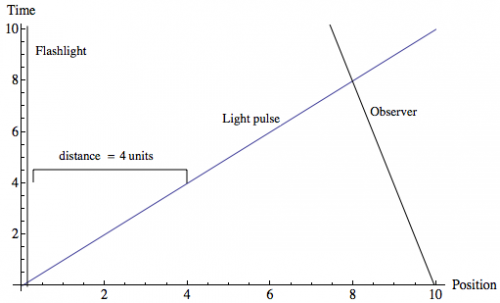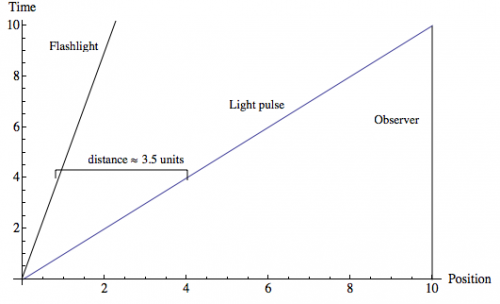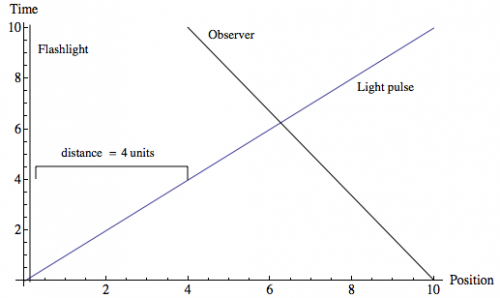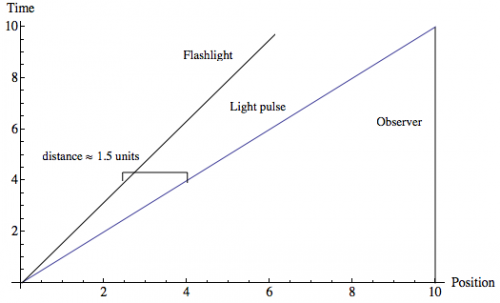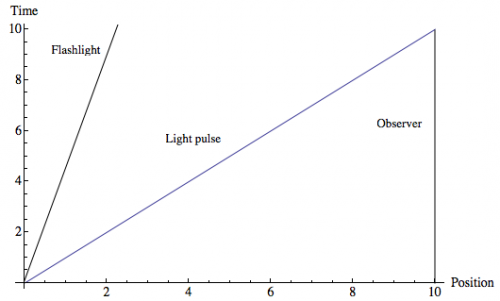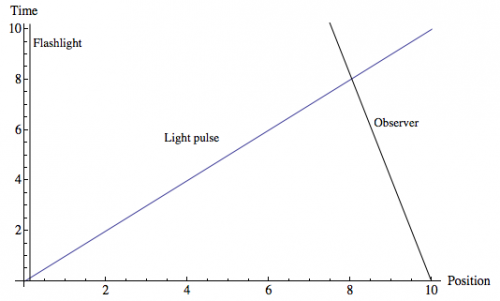-
Posts
11784 -
Joined
-
Last visited
-
Days Won
2
Content Type
Profiles
Forums
Events
Everything posted by Cap'n Refsmmat
-

Frame of Reference as Subject in Subjective Idealism
Cap'n Refsmmat replied to owl's topic in General Philosophy
Also the rest mass, the speed of light, and all of the Lorentz scalars (there are a few). -
Which maneuvers, exactly, were "stunning" and at "very high G-force"?
-
Why should humans be on a level playing field with God?
-

Frame of Reference as Subject in Subjective Idealism
Cap'n Refsmmat replied to owl's topic in General Philosophy
No; it varies between reference frames, as I demonstrated. Yes. We can assume, for the sake of argument, that the holder and the observer have photon detectors at strategic locations which have synchronized clocks, so they can tell exactly where the photon is at what time. According to the observer, yes, this would be true. (Although it's 186,000 miles per second, rather than 300,000.) However, according to the holder of the flashlight, after one second the forward-launched photon would be 186,000 miles away and the rearward one 186,000 miles away. If he did not measure equal distances, then the velocity of a photon would not be constant. -

Frame of Reference as Subject in Subjective Idealism
Cap'n Refsmmat replied to owl's topic in General Philosophy
Sure. So reality is in fact idealist? You have agreed that the distance between the flashlight and the light changes in a different frame of reference, you evil idealist. -

Frame of Reference as Subject in Subjective Idealism
Cap'n Refsmmat replied to owl's topic in General Philosophy
There is a distance between two objects: a flashlight and a photon. In one reference frame, that distance is longer than it is in another reference frame. Is that point not sufficiently clear? Yes. Differences in length only become apparent when you compare lengths between two separate reference frames. -

Frame of Reference as Subject in Subjective Idealism
Cap'n Refsmmat replied to owl's topic in General Philosophy
I was measuring the distance between the flashlight and the light beam, not the distance traveled by the flashlight. Please review the diagrams and let me know if you have any questions. Each unit on the position axis is one light-second; each unit on the time axis is one second. Better? -

Frame of Reference as Subject in Subjective Idealism
Cap'n Refsmmat replied to owl's topic in General Philosophy
Why not? Are the distances after four units of time not different? I chose my example very carefully to illustrate how the constant speed of light changes expectations. You cannot dismiss it by providing a separate example where you do not believe length contraction occurs. "Here is an example where phenomenon x occurs." "Well, here's an example where I don't think it does!" "...so?" -
I think swansont's point was that there's nothing to resign over if a fraudulent paper is discovered; the editor cannot be expected to know if data has been improperly manipulated, since he did not perform the experiment himself, and a paper based on falsified data can draw perfectly reasonable conclusions from that data. In this case, however, it is not the data but the methods which are in question. No. He is upset that overhyped and exaggerated claims received high publicity -- 56,000 downloads. He's not upset that the paper was popular, as your quote should make clear. To add some context, the following sentences: The implication is "I let through a flawed paper which has been widely misconstrued to rebut a well-established theory which it cannot rebut," not "I let through a paper which became popular!"
-
Microsoft Security Essentials is free and fairly fast and effective. Stolen information is more likely these days to be a result of dodgy websites, I suspect. One must be careful not to be tricked by phishing scams and dodgy websites.
-
Irrelevant. God is vastly more powerful than humans. This does not follow. God has a position of power over humans, and defines what is right and wrong; our judgments of morality come from obeying God's rules. Should God behave in a manner contradictory to the rules set down for humans, one can only conclude that what is good for God is not the same as what is good for humans. This is particularly true when you consider the covenant laid out in the Old Testament: the Israelites agreed to obey God's rules in return for the land of Israel and his protection as God. God did not agree to obey any rules. He did not imply that He should obey them. Just like "you're stupid" would speak to my intellect, not to me. Right. You may be surprised to find out that I am not, in fact, theistic in any way. I merely find your arguments against religion tiresome.
-
How is this relevant? I thought my point was that His moral sense does not apply to His actions. The fact that our morality is supposed to be received from God emphasizes the point, since it means Gods actions are by definition moral. He who writes the rules decides what constitutes their violation.
-

Requirements to get B.S. degree in Ornithology
Cap'n Refsmmat replied to uppercut1337's topic in Homework Help
That would depend on the university. You'd want to find the degree plans for a specific university relevant to your essay. In particular, many universities do not offer ornithology degrees at all, but instead do generic zoology or biology degrees. Their requirements vary. -
We may be created in His image as Genesis says, but we do not play the same role that He plays. A statue of Napoleon is not a great emperor or general, regardless of the detail and care put into the statue. Also, Adam and Eve were not omniscient or omnipotent. The nature of received morality -- that is, human morality being defined by God -- implies that it is impossible to judge God's actions as good or evil, since God sets the definitions for humans and clearly does not establish standards of conduct for supernatural beings.
-

Frame of Reference as Subject in Subjective Idealism
Cap'n Refsmmat replied to owl's topic in General Philosophy
Don't worry, that gives me time to make my diagrams. Now I ask the question: after four units of time, how far is the light from the flashlight? From the flashlight's perspective, we have something like this: From the observer's perspective, we have something like this: That's slightly odd. You can, of course, imagine a scenario where the flashlight is moving very close to the speed of light relative to the observer: Very strange. I hope this shows you that the constant speed of light makes the universe less intuitive than one might expect. -

Frame of Reference as Subject in Subjective Idealism
Cap'n Refsmmat replied to owl's topic in General Philosophy
The Sun and the Earth aren't moving towards each other in the requisite way. Regardless, let me finish my point. It is a very simple one. Let's look at this from the observer's perspective now. From the observer's perspective, the light is still moving at the same velocity, but the flashlight is approaching him. It looks like this: Does that diagram make sense? We have a light pulse covering the same distance in the same time -- since it's light -- and the flashlight moving toward the observer. -

Frame of Reference as Subject in Subjective Idealism
Cap'n Refsmmat replied to owl's topic in General Philosophy
Hang on a second. This is a thought experiment. I can have whatever detectors and measurement devices I need to get a perspective on the whole situation. It's not very hard: strap some photodetectors to the front of the flashlight at various distances, and strap other photodetectors to the observer. But that's not very relevant, either. It doesn't matter how it's measured: light will move at c, so all I have to know is the velocity of the flashlight and the observer in each reference frame. We know by experiment how fast the light will be moving. Maybe I can make a diagram to help visualize this problem, because switching between observer and flashlight reference frames can be confusing. Here's the picture from the flashlight's perspective: Time is on the vertical axis, position on the horizontal. As time progresses (goes upward), the flashlight stays in the same place and the observer moves closer. The light pulse moves to the right until it reaches the observer. The observer moves closer to the flashlight at a high speed. Does that diagram make sense, or do I need to clarify things? I apologize for dragging out the point, but I need to make it crystal clear. -
You still haven't explained why God is obligated to follow his own word to mere mortals when he is vastly different.
-

Frame of Reference as Subject in Subjective Idealism
Cap'n Refsmmat replied to owl's topic in General Philosophy
Yes, that makes perfect sense. So you'd agree that from the perspective of the observer, the light only goes 93,000 miles away from the flashlight each second, because the flashlight is moving through the tail end of the beam at half lightspeed? The light is still moving at light speed relative to the observer, of course; I'm asking about how the observer would see its velocity compared to the flashlight. -

Frame of Reference as Subject in Subjective Idealism
Cap'n Refsmmat replied to owl's topic in General Philosophy
I did not make the claim that anyone would observe the light beam to travel at 279,000 miles per second. I said that from the perspective of the flashlight, the light beam would travel away at 186,000 miles per second. (If the flashlight were attached to a 186,000 mile long yardstick, the light would reach the end in one second.) The distance between the flashlight and the light beam increases by 186,000 miles in a second. You agreed. Now, from the perspective of the observer, the flashlight is approaching at 93,000 miles in a second and the light at 186,000 miles per second -- because he has to observe the light beam traveling at c. So in a second, the light gets 186,000 miles closer and the flashlight 93,000 miles closer. The distance between them increases 93,000 miles. How does that work? -

Frame of Reference as Subject in Subjective Idealism
Cap'n Refsmmat replied to owl's topic in General Philosophy
So from the perspective of the holder of the flashlight, after one second the light pulse has moved 186,000 miles away, since he has to observe it moving at c. That makes sense. From the perspective of the observer, after one second the light has moved 186,000 miles and the flashlight 93,000 miles, since the observer is getting closer at half the speed of light. So the light is only 93,000 miles away from the flashlight, since the flashlight is "chasing" it. The two distances are different. How does that work? -

Frame of Reference as Subject in Subjective Idealism
Cap'n Refsmmat replied to owl's topic in General Philosophy
That's exactly what I was thinking, yes. Well, the light is traveling at 186,000 mps. So suppose we look at the front of the light pulse. If the observer has a way to measure where the front of that pulse is -- perhaps some kind of light detector attached to his spaceship -- he can measure its velocity. So, for example, he might measure that after one second, the front edge of the light pulse is a certain distance away from the flashlight, and after another second it's much farther away, and so on. Does that make more sense? -

Frame of Reference as Subject in Subjective Idealism
Cap'n Refsmmat replied to owl's topic in General Philosophy
Hm. So the speed of light is the same in all reference frames. So suppose I have a flashlight. I turn it on. The photons travel ahead of me at the speed of light. If I measured their position compared to mine, I'd see that it increases at the speed of light. So far, so good. Now suppose someone is flying past me at half the speed of light. They're flying in the direction opposite to where the flashlight is pointed. Now, do you agree that the person flying past very fast can measure the light's position compared to his, and see that it increases at the speed of light? That's what "the speed of light is the same in all reference frames" means, of course. -

Frame of Reference as Subject in Subjective Idealism
Cap'n Refsmmat replied to owl's topic in General Philosophy
When you hit the "reply" button, you get something like this: ...where the quote tag has the username and timestamp in it. If you want to split up the post and interject comments, you just copy and paste that initial quote tag, like so: (your message here) (more comments here) Works just fine and lets people know they've been quoted.


